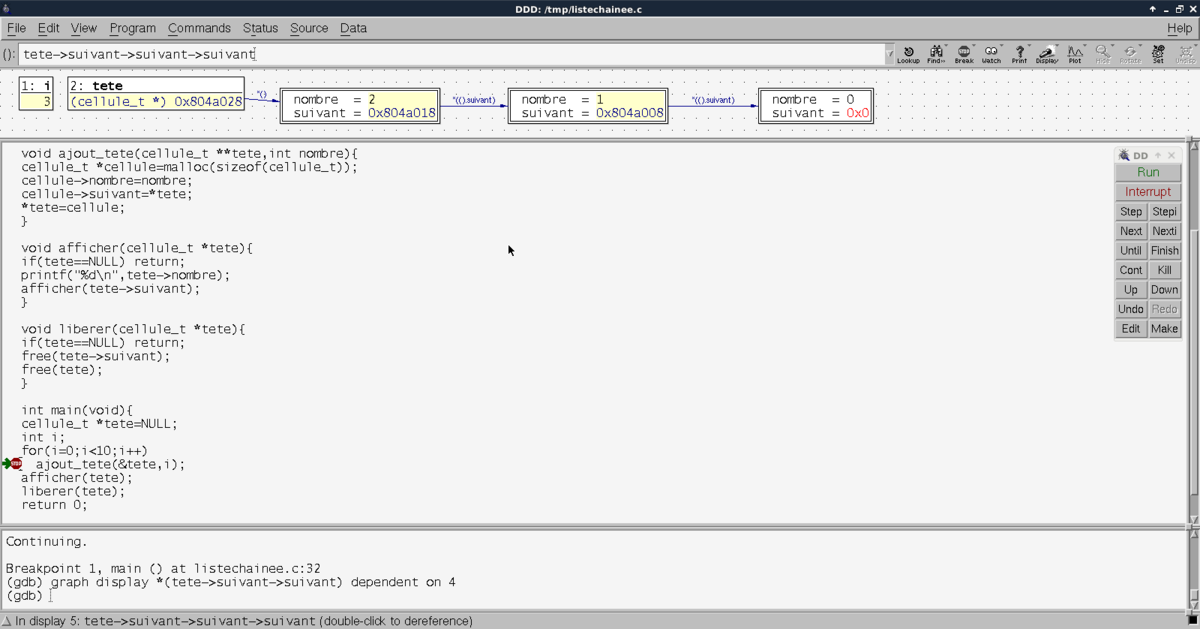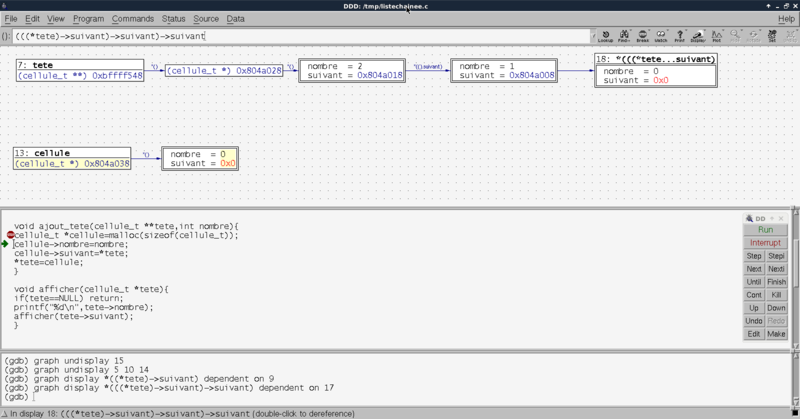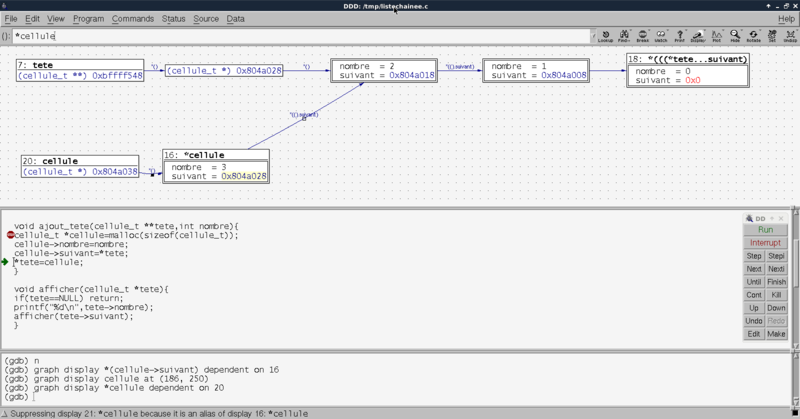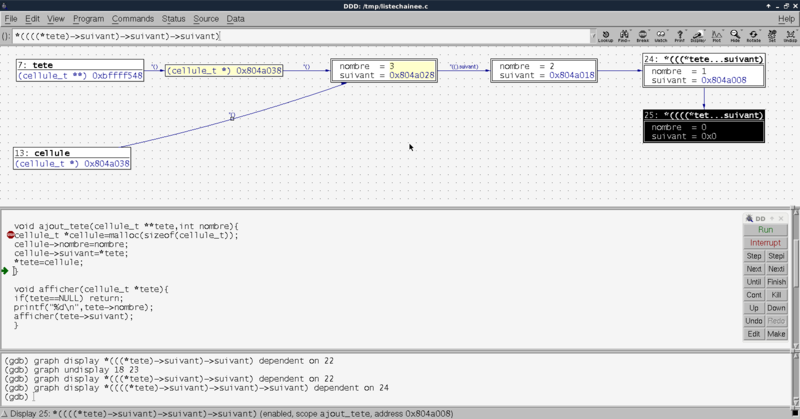- expansion des macros ;
- expansion des fichiers d’entêtes ;
$ gcc -E prog.c -o prog-cpp.c $ cat prog-cpp.c # 1 "prog.c" ... # 319 "/usr/include/stdio.h" ... extern int printf (const char *__restrict __format, ...); ... # 2 "prog.c" 2 int main(void){ int i; i=0; for(i=1;i<=10;i++) printf("%d\n",i); return 0; } - création d’un arbre syntaxique abstrait (AST) ;
- options pour obtenir l’arbre gcc --dump-tree-xxx ;
$ gcc -Wall --dump-tree-original-raw prog.c $ ./ast2dot.rb prog.c.003t.original > prog-original.dot $ dot -Tpng prog-original.dot > prog-original.png
- exercice : retrouvez les deux initialisations de i ;
- avec un compilateur différent : clang -Xclang -ast-dump -fsyntax-only ;
TranslationUnitDecl 0x9bcb300 <<invalid sloc>> <invalid sloc> |-TypedefDecl 0x9bcb5d0 <<invalid sloc>> <invalid sloc> implicit __builtin_va_list 'char *' |-FunctionDecl 0x9bcb6c0 <prog.c:1:12> col:12 implicit referenced printf 'int (const char *, ...)' extern | |-ParmVarDecl 0x9bcb720 <<invalid sloc>> <invalid sloc> 'const char *' | `-FormatAttr 0x9bcb760 <col:12> Implicit printf 1 2 |-FunctionDecl 0x9bcb7a0 prev 0x9bcb6c0 <col:1, col:56> col:12 used printf 'int (const char *, ...)' extern | |-ParmVarDecl 0x9bcb630 <col:20, col:43> col:43 __format 'const char *restrict' | `-FormatAttr 0x9bcb820 <col:12> Inherited printf 1 2 `-FunctionDecl 0x9bcb8c0 <line:5:1, line:10:1> line:5:5 main 'int (void)' `-CompoundStmt 0x9bcbbf0 <col:15, line:10:1> |-DeclStmt 0x9bcb980 <line:6:1, col:6> | `-VarDecl 0x9bcb950 <col:1, col:5> col:5 used i 'int' |-BinaryOperator 0x9bcb9c0 <line:7:1, col:3> 'int' '=' | |-DeclRefExpr 0x9bcb990 <col:1> 'int' lvalue Var 0x9bcb950 'i' 'int' | `-IntegerLiteral 0x9bcb9a8 <col:3> 'int' 0 |-ForStmt 0x9bcbba0 <line:8:1, line:4:41> | |-BinaryOperator 0x9bcba08 <line:8:5, col:7> 'int' '=' | | |-DeclRefExpr 0x9bcb9d8 <col:5> 'int' lvalue Var 0x9bcb950 'i' 'int' | | `-IntegerLiteral 0x9bcb9f0 <col:7> 'int' 1 | |-<<<NULL>>> | |-BinaryOperator 0x9bcba60 <col:9, line:2:13> 'int' '<=' | | |-ImplicitCastExpr 0x9bcba50 <line:8:9> 'int' <LValueToRValue> | | | `-DeclRefExpr 0x9bcba20 <col:9> 'int' lvalue Var 0x9bcb950 'i' 'int' | | `-IntegerLiteral 0x9bcba38 <line:2:13> 'int' 10 | |-UnaryOperator 0x9bcba90 <line:8:16, col:17> 'int' postfix '++' | | `-DeclRefExpr 0x9bcba78 <col:16> 'int' lvalue Var 0x9bcb950 'i' 'int' | `-CallExpr 0x9bcbb48 <line:4:26, col:41> 'int' | |-ImplicitCastExpr 0x9bcbb38 <col:26> 'int (*)(const char *, ...)' <FunctionToPointerDecay> | | `-DeclRefExpr 0x9bcbaa4 <col:26> 'int (const char *, ...)' Function 0x9bcb7a0 'printf' 'int (const char *, ...)' | |-ImplicitCastExpr 0x9bcbb80 <col:33> 'const char *' <BitCast> | | `-ImplicitCastExpr 0x9bcbb70 <col:33> 'char *' <ArrayToPointerDecay> | | `-StringLiteral 0x9bcbae0 <col:33> 'char [4]' lvalue "%d\n" | `-ImplicitCastExpr 0x9bcbb90 <line:8:35> 'int' <LValueToRValue> | `-DeclRefExpr 0x9bcbb04 <col:35> 'int' lvalue Var 0x9bcb950 'i' 'int' `-ReturnStmt 0x9bcbbe0 <line:9:1, line:3:18> `-IntegerLiteral 0x9bcbbc8 <col:18> 'int' 0 - même exercice.




